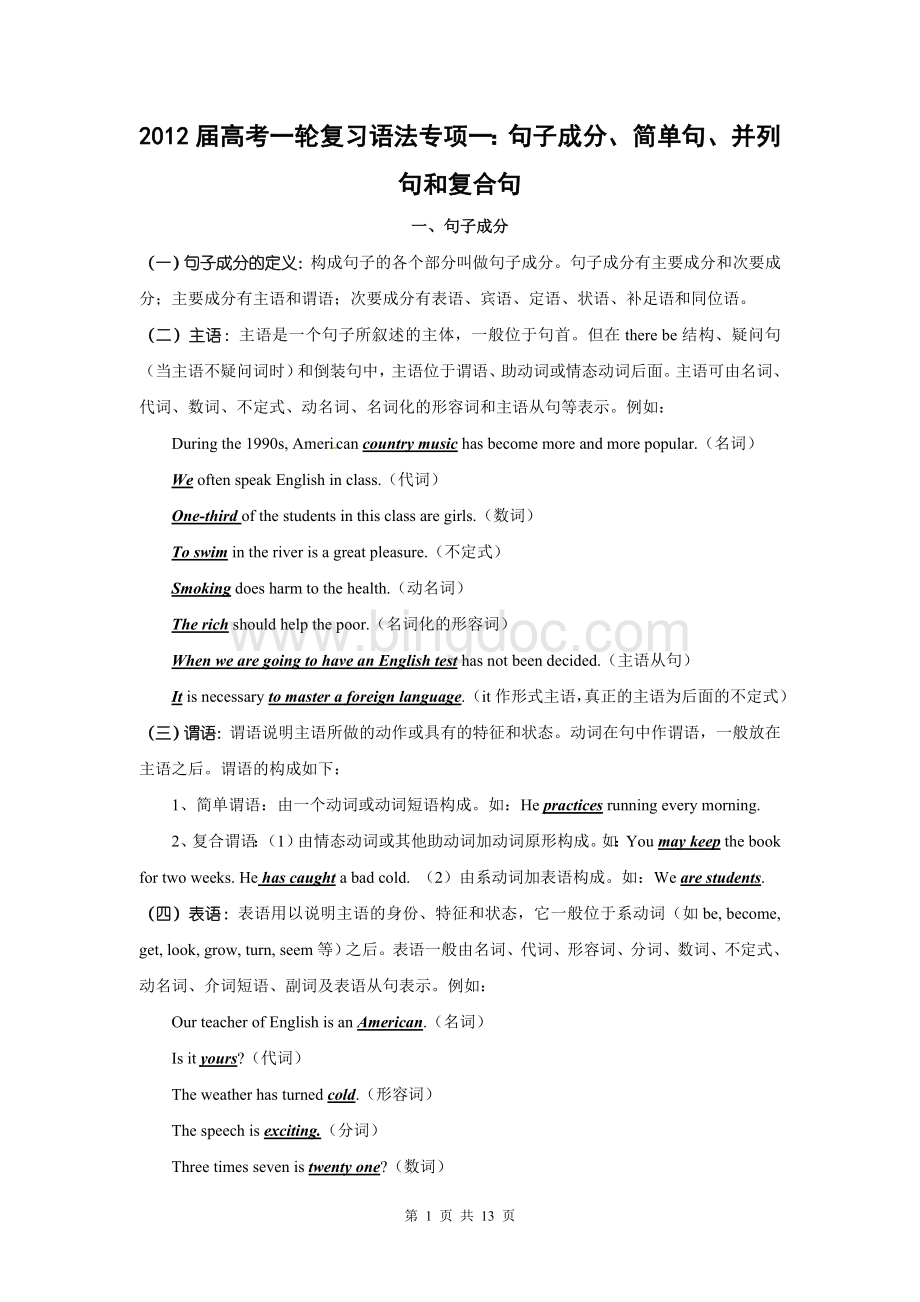高考一轮复习英语语法专项一句子成分、简单句、并列句和复合句.doc
《高考一轮复习英语语法专项一句子成分、简单句、并列句和复合句.doc》由会员分享,可在线阅读,更多相关《高考一轮复习英语语法专项一句子成分、简单句、并列句和复合句.doc(13页珍藏版)》请在冰点文库上搜索。

2012届高考一轮复习语法专项一:
句子成分、简单句、并列句和复合句
一、句子成分
(一)句子成分的定义:
构成句子的各个部分叫做句子成分。
句子成分有主要成分和次要成分;主要成分有主语和谓语;次要成分有表语、宾语、定语、状语、补足语和同位语。
(二)主语:
主语是一个句子所叙述的主体,一般位于句首。
但在therebe结构、疑问句(当主语不疑问词时)和倒装句中,主语位于谓语、助动词或情态动词后面。
主语可由名词、代词、数词、不定式、动名词、名词化的形容词和主语从句等表示。
例如:
Duringthe1990s,Americancountrymusichasbecomemoreandmorepopular.(名词)
WeoftenspeakEnglishinclass.(代词)
One-thirdofthestudentsinthisclassaregirls.(数词)
Toswimintheriverisagreatpleasure.(不定式)
Smokingdoesharmtothehealth.(动名词)
Therichshouldhelpthepoor.(名词化的形容词)
WhenwearegoingtohaveanEnglishtesthasnotbeendecided.(主语从句)
Itisnecessarytomasteraforeignlanguage.(it作形式主语,真正的主语为后面的不定式)
(三)谓语:
谓语说明主语所做的动作或具有的特征和状态。
动词在句中作谓语,一般放在主语之后。
谓语的构成如下:
1、简单谓语:
由一个动词或动词短语构成。
如:
Hepracticesrunningeverymorning.
2、复合谓语:
(1)由情态动词或其他助动词加动词原形构成。
如:
Youmaykeepthebookfortwoweeks.Hehascaughtabadcold.
(2)由系动词加表语构成。
如:
Wearestudents.
(四)表语:
表语用以说明主语的身份、特征和状态,它一般位于系动词(如be,become,get,look,grow,turn,seem等)之后。
表语一般由名词、代词、形容词、分词、数词、不定式、动名词、介词短语、副词及表语从句表示。
例如:
OurteacherofEnglishisanAmerican.(名词)
Isityours?
(代词)
Theweatherhasturnedcold.(形容词)
Thespeechisexciting.(分词)
Threetimessevenistwentyone?
(数词)
HisjobistoteachEnglish.(不定式)
Hishobby(爱好)isplayingfootball.(动名词)
Themachinemustbeoutoforder.(介词短语)
Timeisup.Theclassisover.(副词)
Thetruthisthathehasneverbeenabroad.(表语从句)
(五)宾语:
宾语表示动作的对象或承爱者,一般位于及物动词和介词后面。
例如:
Theywenttoseeanexhibition(展览)yesterday.(名词)
Theheavyrainpreventedmeformcomingtoschoolontime.(代词)
Howmanydictionariesdoyouhave?
Ihavefive.(数词)
Theyhelpedtheoldwiththeirhouseworkyesterday.(名词化形容词)
Hepretendednottoseeme.(不定式短语)
Ienjoylisteningtopopularmusic.(动名词短语)
Ithink(that)heisfitforhisoffice.(宾语从句)
宾语种类:
(1)双宾语(间接宾语+直接宾语),例如:
Lendmeyourdictionary,please.
(2)复合宾语(宾语+宾补),例如:
Theyelectedhimtheirmonitor.
(六)宾语补足语:
英语中有些及物动词,除有一个直接宾语以外,还要有一个宾语补语,才能使句子的意义完整。
带有宾语补足语的一般句型为:
某些及物动词(如make等+宾语+宾补)。
宾补可由名词、形容词、副词、不定式、分词、介词短语和从句充当。
例如:
HisfathernamedhimDongming.(名词)
Theypaintedtheirboatwhite.(形容词)
Letthefreshairin.(副词)
Youmustn’tforcehimtolendhismoneytoyou.(不定式短语)
Wesawherenteringtheroom.(现在分词)
Wefoundeverythinginthelabingoodorder.(介词短语)
Wewillsoonmakeourcitywhatyourcityisnow.(从句)
(七)定语:
修饰名词或代词的词、短语或从句称为定语。
定语可由以下等成分表示:
Guilinisabeautifulcity.(形容词)
Chinaisadevelopingcountry;Americaisadevelopedcountry.(分词)
Therearethirtywomenteachersisourschool.(名词)
HisrapidprogressinEnglishmadeussurprised.(代词)
Ourmonitorisalwaysthefirsttoentertheclassroom.(不定式短语)
Theteachingplanfornexttermhasbeenworkedout.(动名词)
HeisreadinganarticleabouthowtolearnEnglish.(介词短语)
(八)状语:
修饰动词、形容词、副词或整个句子,说明动作或状态特征的句子成分,叫做状语。
可由以下形式表示:
Lighttravelsmostquickly.(副词及副词性词组)
Hehaslivedinthecityfortenyears.(介词短语)
Heisproudtohavepassedthenationalcollegeentranceexamination.(不定式短语)
Heisintheroommakingamodelplane.(分词短语)
Waitaminute.(名词)
Onceyoubegin,youmustcontinue.(状语从句)
状语种类如下:
Howaboutmeetingagainatsix?
(时间状语)
Lastnightshedidn’tgotothedancepartybecauseoftherain.(原因状语)
Ishallgothereifitdoesn’train.(条件状语)
MrSmithlivesonthethirdfloor.(地点状语)
Sheputtheeggsintothebasketwithgreatcare.(方式状语)
Shecameinwithadictionaryinherhand.(伴随状语)
Inordertocatchupwiththeothers,Imustworkharder.(目的状语)
Hewassotiredthathefellasleepimmediately.(结果状语)
Sheworksveryhardthoughsheisold.(让步状语)
Iamtallerthanheis.(比较状语)
练习一
一、指出下列句子划线部分是什么句子成分:
1.Thestudentsgotontheschoolbus.
2.Hehandedmethenewspaper.
3.Ishallansweryourquestionafterclass.
4.WhatabeautifulChinesepainting!
5.Theywenthuntingtogetherearlyinthemorning.
6.Hisjobistotrainswimmers.
7.HetookmanyphotosofthepalacesinBeijing.
8.ThereisgoingtobeanAmericanfilmtonight.
9.HeistoleaveforShanghaitomorrow.
10.Hiswishistobecomeascientist.
11.Hemanagedtofinishtheworkintime.
12.Tomcametoaskmeforadvice.
13.HefounditimportanttomasterEnglish.
14.Doyouhaveanythingelsetosay?
15.Tobehonest;yourpronunciationisnotsogood.
16.Wouldyoupleasetellmeyouraddress?
17.Hesatthere,readinganewspaper.
18.Itisourdutytokeepourclassroomcleanandtidy.
19.Henoticedamanentertheroom.
20.Theapplestastedsweet.
二、用符号划出下列短文各句中的主语(—)、谓语(=)、宾语(~):
Ihopeyouareverywell.I'mfine,buttired.RightnowitisthesummervacationandI'mhelpingmyDadonthefarm.Augustisthehottestmonthhere.Itisthetimeofyearforthericeharvest,soeverydayIworkfromdawnuntildark.Sometimeswegoonworkingafterdarkbythelightsofourtractors.WegrowriceinthesouthoftheStates,butinthenorthwhereitiscoldertheygrowwheat.Wehavealotofmachinesonthefarm.Althoughthefarmislarge,myDadhasonlytwomenworkingforhim.Butheemploysmoremenfortheharvest.Mybrothertakescareofthevegetablegarden.Itdoesn'toftenraininthesummerhere.Asaresult,wehavetowaterthevegetablegarden.Everyeveningwepumpwaterfromawell.Itthenrunsalongchannelstodifferentpartsofthegarden.
三、用符号划出下列短文各句中的定语(—)、状语(=)、补语(~):
MostSaturdayeveningsthereisaparty,evenatharvesttime.Thesepartiesoftenmakeusveryhappy.Wecookmeatonanopenfireoutside.It'sgreat!
Americanseatalotofmeat—toomuchinmyopinion.Someofmyfriendsdrinkbeer.Idon't,becauseIhavetodrivehomeaftertheparty.InyourletteryouaskedaboutthetimeindifferentareasoftheStates.TherearefivedifferenttimeareasintheStates.InmystatewearefourteenhoursbehindBeijingtime.HowmanydifferenttimeareasdoyouhaveinChina?
Well,Imuststopandgetsomesleep.Pleasegivemybestregardstoyourparents.
四、选择填空:
()1.____willleaveforBeijing.
A.Nowtheretheman B.Themanherenow
C.Themanwhoisherenow D.Themanisherenow
()2.Theweather____.
A.wetandcold B.iswetandcold C.notwetandcold D.werewetandcold
()3.Theappletasted____.
A.sweets B.sweetly C.nicely D.sweet
()4.Hegotup____yesterdaymorning.
A.lately B.late C.latest D.latter
()5.Theactor______attheageof70.
A.deadB.died C.dyed D.deaded
()6.____wereallverytired,butnoneof____wouldstoptotakearest.
A.We,usB.Us,we C.We,our D.We,we
()7.Hefoundthestreetmuch______.
A.crowd B.crowding C.crowded D.crowdedly
()8.Ithink_____necessarytolearnEnglishwell.
A.its B.it C.that D.thatis
()9.Thedog____mad.
A.looks B.islooked C.isbeinglooked D.waslooked
()10.Iwillneverforgettheday______Ijoinedthearmy.
A.that B.when C.inwhich D.where
二、简单句、并列句和复合句
(一)句子种类两种分类法
1、按句子的用途可分四种:
1)陈述句(肯定、否定):
Heissixyearsold;Shedidn’thearofyoubefore.
2)疑问句(一般、特殊、选择、反意):
Dotheylikeskating?
Howoldishe?
Ishesixorsevenyearsold?
Marycanswim,can’tshe?
3)祈使句:
Becareful,boys;Don’ttalkinclass
4)感叹句:
Howclevertheboyis!
2、按句子的结构可分三种:
1)简单句:
只有一个主语(或并列主语)和一个谓语(或并列谓语)。
e.g.HeoftenreadsEnglishinthemorning.
TomandMikeareAmericanboys.
Shelikesdrawingandoftendrawspicturesforthewallnewspapers.
2)并列句:
由并列连词(and,but,or等)或分号(;)把两个或两个以上的简单句连在一起构成。
e.g.Youhelphimandhehelpsyou.
Thefutureisbright;theroadistortuous.前途是光明的,道路是曲折的。
3)复合句:
含有一个或一个以上从句的句子。
复合句包含:
名词性从句(主语从句、宾语从句、表语从句和同位语从句)、定语从句和状语从句等。
e.g.TheforeignvisitorstookalotofpictureswhentheywereattheGreatWall.
(二)简单句的五种基本句型
1、主语+系动词+表语:
e.g.Heisastudent.
2、主语+不及物动词:
e.g.Wework.
3、主语+及物动词+宾语:
e.g.Henryboughtadictionary.
4、主语+及物动词+双宾语(间接宾语+直接宾语):
e.g.Myfatherboughtmeacar.
5、主语+及物动词+复合宾语(宾语+宾补):
e.g.Tommadethebabylaugh.
注:
其他各种句子都可由这一种基本句型扩展、变化或省略而构成。
(三)并列句的分类
1、表示连接两个同等概念,常用and,notonly…butalso…,neither…nor…,then等连接。
e.g.Theteacher’snameisSmith,andthestudent’snameisJohn.
2、表示选择,常用的连词有or,either…or…,otherwise等。
e.g.Hurryup,oryou’llmissthetrain.
3、表示转折,常用的连词有but,still,however,yet,while,when等。
e.g.Hewasalittlemanwiththickglasses,buthehadastrangewayofmakinghisclasseslivelyandinteresting.
4、表示因果关系,常用的连词有so,for,therefore等。
e.g.Augustisthetimeoftheyearforriveharvest,soeverydayIworkfromdawnuntildark.
(四)高考考点探讨
1、简单句的五大句型是最基本的句型。
虽然近几年单纯考查这种基础句型的题不多,但是在阅读中有时需借助于划分句子成分去理解,在书面表达中,没有最基本的遣词造句的能力是不可能用地道的英语句子来表达清楚的。
2、祈使句、反意疑问句和感叹句是高考命题的热点之一。
有时把祈使句与反意疑问句结合于一体来考查。
一个题目,几个考点,是近几年命题的发展趋势。
3、高考对简单句、并列句和各种复合句的考查常表现在对连词的选择和使用上。
如:
and,but,or,while,以及其它连接名词性从句、定语从句和状语从句的连接词、关联词。
4、各种主从复合句的考查常常与动词的时态联系在一起,以宾语从句与状语从句最为明显,时间从句与条件从句中,如果主句是将来时,从句则用一般式表将来,这一点在高考中经常考查。
如:
Wewillgooutingifitdoesn’traintomorrow。
练习二、简单句、并列句和复合句
一、判断下列句子是简单句、并列句还是复合句:
1.WeoftenstudyChinesehistoryonFridayafternoon.
2.TheboywhoofferedmehisseatiscalledTom.
3.Thereisachairinthisroom,isn’tthere?
4.MybrotherandIgotoschoolathalfpastseveninthemorningandcomebackhomeatsevenintheevening.
5.HeisinClassOneandIaminClassTwo.
6.Hewasfondofdrawingwhenhewasyetachild.
7.Neitherhashechangedhismind,norwillhedoso.
8.Whathesaidatthemeetingisveryimportant,isn’tit?
9.Thefarmerisshowingtheboyhowtoplantatree.
10.BothTomandJackenjoycountrymusic.
二、判断下列短文中各句是简单句、并列句还是复合句:
Ihopeyouareverywell( ).I'mfine,buttired( ).RightnowitisthesummervacationandI'mhelpingmyDadonthefarm( ).Augustisthehottes